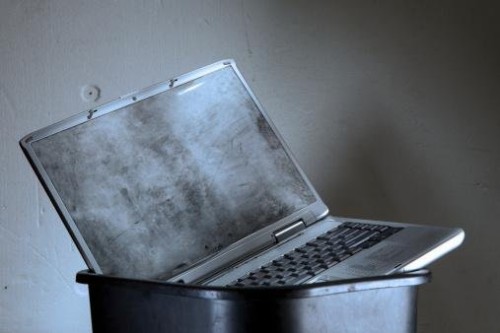 According to foreign media reports, the view that the “PC deadline will come†has already spread around the market. Although the data from many market research organizations have further proved the correctness of this point of view, the famous Times magazine still maintains that. Hold reservations. Recently, Jared Newman, a special writer for Time magazine, wrote about the article: “The PC is not dead, but it is only beginning to break the inherent form and continue to be active in the marketâ€.
According to foreign media reports, the view that the “PC deadline will come†has already spread around the market. Although the data from many market research organizations have further proved the correctness of this point of view, the famous Times magazine still maintains that. Hold reservations. Recently, Jared Newman, a special writer for Time magazine, wrote about the article: “The PC is not dead, but it is only beginning to break the inherent form and continue to be active in the marketâ€. The following is the main content of the article:
At present, a common view held by analysts in the science and technology industry is that "PC is about to go." But the fact is that the situation may not be as bad as people think, especially for the United States.
According to data from well-known market research firm Gartner, global PC sales in the previous quarter fell 10.9% year-on-year, and PC shipments also ushered in the fifth consecutive quarter of decline. However, the situation in the United States is much more optimistic. The overall PC shipments in the region fell by only 1.4% in the previous quarter, which is the smallest year-on-year decline since 2012. Among them, Lenovo and Dell's PC business even ushered in 20% and 6.4% increase. Even if the performance of the PC business of Hewlett-Packard Co., Ltd., which has just given less than expected quarterly earnings, is still relatively stable, the company’s PC shipments have only declined slightly by 0.5%.
Although the 1.4% decline in overall shipments of PCs is not good news, the “freefall†decline in US PC shipments in previous quarters has been quite satisfactory. In the previous quarter, PC shipments in the U.S. market fell by 9.6%, compared to 5.7% in the year before.
In response, Gartner chief analyst Mikako Kitagawa said, "The main reason for this situation is that professional users have finally decided to upgrade their old Windows XP system. Moreover, Microsoft has announced that it will stop for the next year. The support of the XP system, on the other hand, has stimulated the determination of companies to upgrade hardware devices."
Of course, this situation is equally pros and cons. On the one hand, enterprise customers are now stepping up their upgrades to the Windows 8 platform. But at the same time, once this wave is gradually receding, the shipment of PC equipment may again be stagnant or even retrogressive.
Gartner believes that, in either case, the shrinking of the traditional PC market is already an indisputable fact. More and more PC users have given up buying new laptops or desktops and instead started buying tablets that meet their daily needs. This means that more and more consumers believe that having one or two traditional PCs in each family is enough to meet their work needs, and tablet computers will be further popularized.
Even harder to define. Although the situation in the PC industry is now clear, we still dare not make bold speculations about the future of this field. At present, Microsoft is trying to break the boundaries between traditional PCs, smart phones and tablets, and bring the uniform use experience to customers. Among them, some Microsoft "mixed" devices have successfully blurred the difference between tablet PCs and notebooks. On the other hand, the low-end notebook market seems to have begun to attract the attention of more and more consumers. Among them, the appearance of Google Chrome's Chromebook provides consumers with a cheap channel for accessing the Internet with a complete desktop experience, and this trend is increasingly gaining recognition.
Intel, the chip maker, said that the company will introduce a corresponding processor chip later this year for low-cost touch screen devices equipped with Windows or Android operating systems.
It is worth mentioning that as the manufacturing process continues to improve, traditional notebooks have also become thinner, lighter, and have better battery life. Among them, Apple's new Macbook Air is the best example. We expect that the majority of Windows PC manufacturers will respond by launching a series of high-end, ultra-thin high-end notebook products in the future.
After considering all of the above factors, we can clearly feel that "PC is not dead, but it is only gradually beginning to gradually break the inherent form and continue to be active in the market." There is no doubt that cheap tablet PCs will continue to be favored by consumers in the future, but this does not mean that other devices will not have room to survive because there is still much work that tablet computers cannot do. This is the most important definition of the so-called "post-PC era", and it is also the aspect that such research institutions as Gartner cannot make accurate predictions through simple data.
A Power Cord, line cord, or mains cable is an electrical cable that temporarily connects an appliance to the mains electricity supply via a wall socket or extension cord. The terms are generally used for cables using a power plug to connect to a single-phase alternating current power source at the local line voltage-(generally 100 to 240 volts, depending on the location). The terms power cable, mains lead, flex or kettle lead are also used. A lamp cord (also known as a zip cord) is a light-weight, ungrounded, single-insulated two-wire cord used for small loads such as a table or floor lamp.
Power Cord
Power Cord,Home Appliance Power Cord,Power Cable Cord
Dongguan YAC Electric Co,. LTD. , https://www.yacenter-cn.com